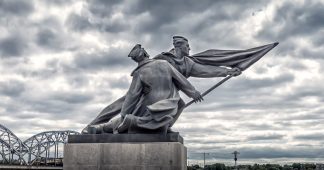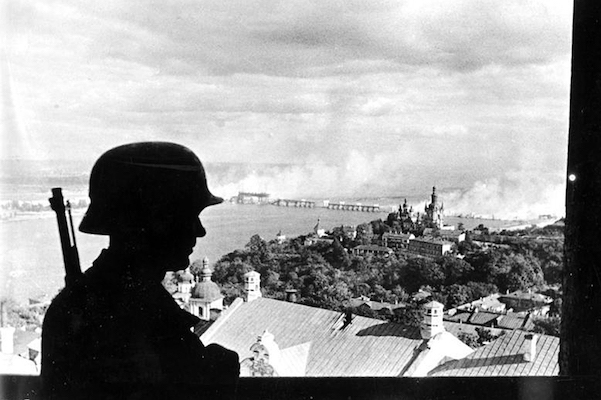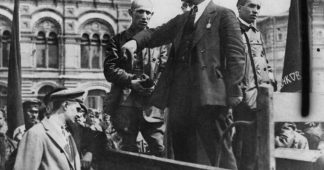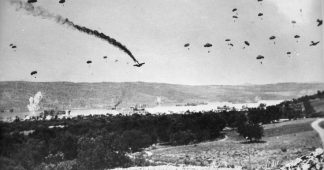During his thirty-year rule of the Soviet Union, Joseph Stalin succeeded in stifling all opposition. There was never a serious threat to his leadership. But there was one occasion, at the end of June 1941, when Stalin suffered what may have been a mental breakdown. When, after three days, his colleagues came for him, he fully expected to be arrested.
But they hadn’t come to arrest him, they’d come to plead with him, begging him to return and take control. Stalin had survived and was to remain in power until his death twelve years later. But what had brought about Stalin’s temporary collapse, and why did his Politburo colleagues fail to bring to an end his murderous rule?
We doubt the veracity of your information
On 23 August 1939, the Nazis and Soviets had signed a non-aggression pact. But both sides knew it was never meant to be more than a postponement of hostilities.
In September 1940, Joachim vonRibbentrop, Hitler’s Foreign Minister, invited the Soviet Union to join the Tripartite Pact, an alliance of initially three Axis powers (Germany, Italy and Japan) that was drawing more nations to its mast, including Romania, Bulgaria and Yugoslavia. In response, Stalin sent his foreign minister, Vyacheslav Molotov, to Berlin for talks. The talks failed dismally (Joseph Goebbels, Hitler’s Minister for Propaganda, described Molotov and his companions as ‘Bolshevik subhumans’). Molotov returned empty-handed to Moscow whilst Hitler announced plans for the invasion of the Soviet Union.
Over the next few months, Stalin permitted limited fortification of his western border but otherwise was determined not to do anything that might provoke the Germans. Stalin’s spies had forewarned him time and again of the expected attack but he refused to believe it. A German Communist spy, Richard Sorge, based in Tokyo, microfilmed detailed reports on the impending invasion, including troop numbers and even the date – 22 June 1941. His efforts were dismissed with the curt “We doubt the veracity of your information.”
Stalin even refused to listen to Winston Churchill, who warned him of an imminent attack, dismissing the British prime minister’s advice as provocative. When, on the eve of invasion, a German deserter crossed the border into the Soviet Union and informed the Red Army of the attack, Stalin ordered him shot for spreading misinformation. Stalin even allowed the continuation of Russian food and metal exports to the Germans, as agreed in the Pact, and forbade the evacuation of people living near the German border and the setting up of defences.
War
At 3 a.m. on 22 June 1941, Stalin went to bed. An hour later, Hitler launched Operation Barbarossa, Germany’s invasion of the Soviet Union.
Stalin’s determination not to prepare for war came at a heavy cost. Within the first day, one quarter of Russia’s air strength had been destroyed – rows of planes sat on the airfields without camouflaged providing the Luftwaffe, the German air force, an easy target. His soldiers were unprepared, often in the wrong place and lacking ammunition. Stalin’s generals believed that Hitler’s main thrust would aim towards Moscow via Minsk and Smolensk. Stalin, thinking he knew best, believed Hitler’s main thrust would be southwards towards the rich resources of the Ukraine, so, accordingly, the bulk of the Red Army was moved south. The generals were proved right but no one dared remind Stalin.
Stalin went into overdrive despite looking, as Nikita Khrushchev, Stalin’s successor, later described him, “a bag of bones in a grey tunic.” Everything went through Stalin – from what journalist wrote what for the Soviet newspaper Pravda, down to the length of bayonet to be manufactured.
On 28 June, news came through that the Germans had taken Minsk, 300 miles into Soviet territory. The road to Smolensk and ultimately to Moscow lay open. Stalin, furious and by now exhausted after days without sleep, paid a visit to his top generals, including GeorgyZhukov. Stalin’s anger reduced Zhukov, a hard-nosed, bull-necked, merciless commander, to tears. Molotov offered Zhukov his handkerchief.
“We’ve fucked it up”
The very survival of the Soviet Union was at stake and Stalin was at a loss. “Lenin founded our state,” he said despondently as he left, “and we’ve fucked it up.” And with that, he retired to his dacha.
And there he stayed for three days – refusing to answer the telephone, refusing to see anyone. He may well have suffered a form of collapse. He had made some disastrous decisions in the years leading up to the war and now they were coming back to bite him.
During the late 1930s, in an act of paranoia and jealously, he purged his military, getting rid of his ablest field marshals and generals and decimating the officer corp. 40,000 Red Army personnel, deemed politically out of step, were purged. Amongst the victims were men who advocated a reform of the Soviet Union’s military methods, calls that Stalin, on the whole, ignored. Stalin now found himself bereft of his finest military thinkers. Khrushchev wrote in his memoirs, “There is no question that we would have repelled the fascist invasion much more easily if the upper echelons of the Red Army command hadn’t been wiped out. They had been men of considerable expertise and experience.”
But Stalin’s motive for disappearing for three days may have been more sinister. Ivan IV, the sixteenth century Russian tsar, more commonly remembered as Ivan the Terrible, had once faked a disappearance to see how his men reacted, and which ones remained loyal. Stalin, who knew well the history of Ivan the Terrible, may have been employing the same trick.
None more worthy
Either way, after three days, a small delegation came knocking at his door. Headed by Molotov (pictured to Stalin’s right), Lavrentii Beria (Stalin’s Chief of Secret Police), Kliment Voroshilov (Defence, to Stalin’s left) and Anastas Mikoyan (Foreign Trade), they found Stalin sitting at his desk. He had on his face a look of fear. Mikoyan later wrote, “I have no doubt – he decided we had come to arrest him.” Stalin was looking thinner, haggard and hadn’t changed his clothes.
“Why have you come?” he asked.
Molotov stepped forward, “We’re asking you to return to work.”
Stalin dithered, “But can I live up to people’s expectations? Can I lead the nation to a final victory? There may be more deserving candidates.”
“There’s none more worthy,” said Voroshilov.
Molotov told Stalin of their idea to form a State Defence Committee, to which Stalin asked, “Yes, but with whom at its head?”
”You, Comrade Stalin,” came the answer, “You.”
The Politburo were nothing without their leader, and at this time of national crisis only Stalin had the force to lead them out of danger, only Stalin had the strength to unite the vast empire. And thus, Stalin survived.
“We were witness to his moment of weakness,” recalled Beria later, “and for that he’ll never forgive us.”
On 3 July, Stalin delivered his first speech to the nation since the invasion eleven days previously. His usual political rhetoric, whilst still there, was played down, instead he spoke in patriotic terms, pulling together his people to defeat the beast that was now in their midst: “Comrades, citizens, brothers and sisters, men of our Army and Navy! My words are addressed to you, dear friends!” he began. “The Red Army, Red Navy and all citizens of the Soviet Union must defend every inch of Soviet soil, must fight to the last drop of blood for our towns and villages, must display the daring, initiative and mental alertness that are inherent in our people.”
Stalin was back.
Published at http://www.historyinanhour.com/2011/07/01/stalins-breakdown/









